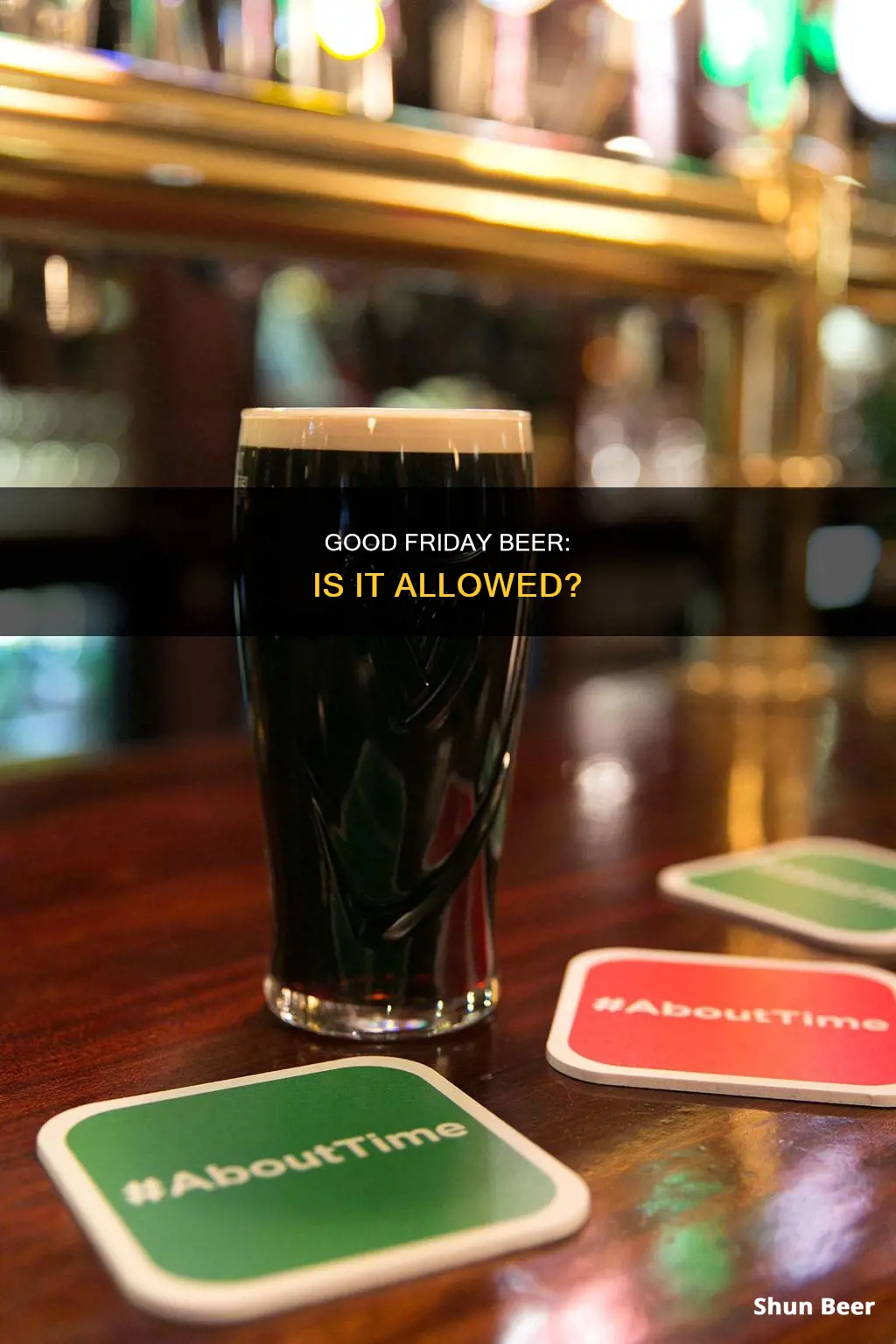
Good Friday is a day of fasting and abstinence for Christians, who recall the crucifixion of Jesus. While many choose to abstain from alcohol on this day, there is no formal ban on drinking beer or other alcoholic beverages. In fact, according to Catholic tradition, fasting only applies to solid foods, so one is permitted to consume liquids, including beer and other types of alcohol. However, drinking alcohol on Good Friday is not seen as ideal, and it is a personal choice for Christians who wish to abstain.
Can I drink beer on Good Friday?
| Characteristics | Values |
|---|---|
| Is drinking alcohol on Good Friday prohibited by the Catholic Church? | No. |
| Is drinking alcohol on Good Friday considered ideal? | No. |
| Is drinking alcohol on Good Friday prohibited by law in Ireland? | Not anymore. |
What You'll Learn

Good Friday is a day of fasting and abstinence from meat for Catholics
On Good Friday, Catholics are required to fast, which means they can eat one full meal and two smaller meals that do not equal a full meal. Liquids, including water, soda, coffee, tea, juices, and milk, are allowed. While there is no formal ban on drinking beer, wine, or spirits, alcoholic beverages are not seen as ideal drinks to be consumed on this solemn day.
The laws regarding fasting and abstinence in the Catholic Church have evolved over time. Historically, the Church observed more stringent fasting and abstinence practices during Lent and on specific days like Good Friday. However, in recent decades, the requirements have been relaxed in some countries. For example, the bishops' conferences in some territories have obtained permission to substitute pious or charitable acts for abstinence from meat on Fridays, except for Good Friday.
The current practice of fasting and abstinence is regulated by Canons 1250-1253 of the 1983 Code of Canon Law. These canons specify that Good Friday is a day of obligatory fasting and abstinence for Catholics. The law of fasting applies to those between the ages of 18 and 59, while the law of abstinence from meat applies to those aged 14 and above.
In summary, Good Friday is a day of fasting and abstinence from meat for Catholics, with specific guidelines provided by the Church to regulate food and drink consumption. While alcohol consumption is not prohibited, it is generally not encouraged on this solemn day of remembrance and penance.
Beer Drinking: Is It in Your Genes?
You may want to see also

There is no formal ban on drinking alcohol on Good Friday
Good Friday is a day of fasting and abstinence for Catholics, and Christians more generally. However, this does not necessarily include alcohol. While many Catholics may choose to abstain from alcohol on Good Friday, there is no formal ban on drinking alcohol on this day.
According to Anthony D. Andreassi, a parish priest in Brooklyn, NY, "there is no prohibition from drinking alcohol on Good Friday." Indeed, the United States Conference of Catholic Bishops states that "a person is permitted to eat one full meal, as well as two smaller meals that together are not equal to a full meal," without specifying whether or not this includes liquid beverages.
Historically, Catholics during Lent fasted but did not necessarily abstain from alcohol. In fact, drinking alcohol was often safer than drinking water, as a little wine added to water would kill water-borne pathogens. Additionally, low-alcohol beer contained just enough alcohol to kill germs but not enough to impair one's work skills.
While there is no formal ban on drinking alcohol on Good Friday, it is ultimately a personal choice. Some people may choose to abstain from alcohol to commemorate the somber nature of the day, while others may choose to drink in moderation.
Alcoholics and Beer: Is It Ever Safe?
You may want to see also

Alcoholic drinks are allowed, but not seen as ideal
Good Friday is a day of fasting and abstinence for Catholics, and while there is no formal ban on drinking alcohol, it is not seen as an ideal drink for the occasion.
Fasting and abstinence are integral parts of the Lenten season, which is a time of penance and atonement for sins. Fasting is seen as a way to unite oneself to Christ, and alcohol is not always considered to be in keeping with this spirit of penance.
Historically, Catholics did not abstain from alcohol during Lent, and there are several reasons for this. Firstly, drinking alcohol was often safer than drinking water, as a little wine or beer could kill water-borne pathogens. Secondly, alcohol, especially beer, provided extra nutrients and vitamins during the Lenten fast. A special beer called doppelbock was invented to provide sustenance during Lent, and monks in Bavaria lived on a beer called Salvator for the entire season.
While alcohol is allowed, Good Friday is a solemn day, and drinking alcohol is not considered appropriate by some. Catholics are encouraged to focus on Christ's passion, and drinking alcohol could be seen as detracting from this.
Beer Glasses and Children: Safe Drinking Options
You may want to see also

Good Friday commemorates the day Jesus was crucified
Good Friday commemorates the crucifixion of Jesus Christ and his death at Calvary. It is observed during Holy Week as part of the Paschal Triduum. The day is also known as Black Friday, Holy Friday, and Great Friday.
Good Friday is a Christian holy day, and members of many Christian denominations, including the Catholic, Eastern Orthodox, Lutheran, Anglican, Methodist, Oriental Orthodox, United Protestant, and some Reformed traditions, observe it with fasting and church services.
The day is marked by fasting and church services, with some Catholics treating it as a day of abstinence from alcohol, while others see no formal injunction against drinking beer, wine, or spirits. Good Friday is a widely recognised legal holiday around the world, including in most Western countries and 12 US states.
The day is marked by various traditions and rituals, including the Service of the Great Three Hours' Agony, which is held from noon until 3 pm, the hours the Bible records darkness covering the land until Jesus' death on the cross. Communicants of the Moravian Church have a Good Friday tradition of cleaning gravestones in cemeteries.
Good Friday is a day of mourning and quiet prayer for many Christians. Statues, paintings, and crosses may be draped in black, purple, or grey cloth, and some Catholics treat it as a day of fasting or partial fasting, excluding meat. Some choose to play music, such as J.S. Bach's St. Matthew's Passion, while others bake hot cross buns, a traditional Good Friday sweet.
Beer and Rapaflo: Safe Mix or Health Risk?
You may want to see also

In the past, alcohol was often safer to drink than water
Drinking alcohol on Good Friday is a topic of much debate. While some sources claim that it is allowed, others suggest that it is discouraged. According to an article by America Magazine, there is no prohibition from drinking alcohol on Good Friday within the Catholic Church. In fact, a group of Brooklyn men, along with their parish priest, Father Andreassi, will be sharing a few German beers after the Good Friday liturgy, adhering to church tradition and laws. This is further supported by the United States Conference of Catholic Bishops, who state that while fasting is encouraged, there is no mention of abstaining from liquids, including alcohol.
Historically, Good Friday has been a day of solemn reflection for Christians, commemorating the day Jesus was crucified. As such, while alcoholic beverages may be allowed, they are not seen as ideal drinks to be consumed on this day.
Now, moving on to the topic of alcohol being safer to drink than water in the past, it is important to note that this claim has been disputed by some historians. While it is true that waterborne diseases were a significant concern, especially in rural areas, the notion that people exclusively drank alcohol due to water quality issues is not supported by historical records.
However, it is worth acknowledging that water quality varied greatly depending on the region and time period. In some cases, waterborne pathogens like cholera, E. coli, and Giardia lamblia could contaminate drinking water sources, leading to outbreaks of waterborne illnesses. This was particularly true in cities before the implementation of modern water treatment and sanitation systems.
In contrast, people in the past may have had a preference for alcoholic beverages due to their flavour and nutritional value. For example, in Sweden and Denmark, beer was the everyday drink, with some individuals drinking it exclusively. This could also be attributed to the availability of grain for brewing and the cultural norms of the time.
In conclusion, while alcohol may have been consumed in the past due to its safety compared to potentially contaminated water sources, it is not accurate to claim that people solely relied on alcoholic beverages for hydration. The decision to drink alcohol or water was likely influenced by a combination of factors, including water quality, cultural norms, and personal preferences.
Old Beer: Is It Safe to Drink After Four Years?
You may want to see also
Frequently asked questions
There is no formal prohibition from the Catholic Church on drinking alcohol on Good Friday. However, some Catholics choose to abstain from drinking on this day.
Good Friday is a day of fasting and abstinence for Catholics, who are required to fast but only from solid foods. This means that they are allowed to consume liquids, including beer and other alcoholic beverages.
Good Friday is a somber day for Christians as they recall and show regard for the day Jesus was crucified. Fasting is seen as a form of penance and atonement for sins.
Apart from beer, you can opt for classic red wine, white wine, cocktails, freshly squeezed fruit juices, tea, coffee, sodas, milk, sports drinks, or plain water.







